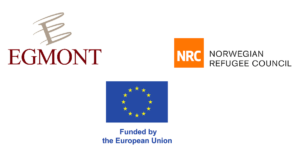EHF 2024: preliminary brainstorming sessions – Breaking the cycle: could the integration of funding mechanisms be the answer to neglected crises?

Date
19 January 2024
Time
10:00-13:00
Location
Meeting room of the Egmont Institute, Rue des Petits Carmes 24A, B-1000 Brussels
Type of Event
Brainstorming
Organisation
Egmont Institute and NRC

Concept
A handful of crises make the headlines each year, generating both political and societal heightened interest. This spotlight effect allegedly creates a paradigm where other humanitarian situations – having often reached a phase of protraction – are progressively deprioritized into a cycle of neglect.
Whether these crises are overlooked intentionally due to a lack of interest or relegated to a lower priority because of constrained capacity and resources, numerous individuals contend that they all face challenges stemming from segmented institutional funding mechanisms.
This session aims to explore if the gradual alignment of funding instruments – including those of the EU – towards a more integrated approach could contribute to providing consistency and continuity in addressing forgotten crises.
Rationale
Often left as sole responders in degraded contexts where international cooperation stopped (e.g., Myanmar, Mali), has been hindered by endemic insecurity (Central African Republic, Haiti, Nigeria), or both (Burkina Faso), humanitarians must often push the traditional boundaries of their action. In these contexts, the difficulty in identifying political solutions and development perspectives is often discouraging and rapidly pushing these crises away from the spotlight. At the field level, the discontinuity between humanitarian, development, and peacebuilding funding instruments does not reflect the coexistence of immediate and longer-term needs.
Nexus-driven responses have sought to reconcile these operational and financial logics without aspiring to a profound overhaul of existing financing mechanisms. EU instruments (INTPA/NEAR, FPI, and ECHO) keep on following distinct logics, making it difficult to achieve a unified response in fragile contexts, where humanitarian needs coexist with infrastructure and poverty issues. A gradual shift has however been operating lately at EU level: DG ECHO gradually shifted from humanitarian response to crisis management, while the priority given to the Global Gateway leaves space for a stronger alignment between traditional ODA and the external action priorities.
Will these initiatives allow to better serve the interest of neglected crises, or is an alternative alignment of EU external aid instruments necessary?
Programme
Opening
• Edouard Rodier, Director NRC Europe & Senior Associate Egmont Institute
Keynote Introduction
• Laura Cogels, Head of the Humanitarian Aid Unit, Ministry of Foreign Affairs Belgium
Brainstorming scoping and fact-checking
• Edouard Rodier
Question 1: What is preventing the response and its funding instruments from being better balanced?
Protracted and neglected crises have increasingly relied on humanitarian funding compared to development and peace funds while their populations often remained the most exposed to extreme poverty and instability. This tension has become unbearable with the growing humanitarian funding gap and calls for a rebalancing of the funding instruments in protracted and complex crises – often the most neglected ones. Review of the main lessons learnt from recent attempts to implement the triple nexus.
Question 2: Coordination VS Alignment: should the governance of funding instruments be reformed?
Some donors have started developing instruments adapted to complex and protracted crises, others have embraced a more integrated approach to consider crises responses in a more holistic way. Many continue to develop humanitarian, development, and peace approaches in silos. What are the actual obstacles to aligning strategies? How much are they contributing to push some crises into the cycle of neglect?
Question 3: What does it mean for the EU crisis response?
What would it take for a comprehensive EU response to crises to overcome challenges encountered in implementing the Triple Nexus? How much could it contribute to restore interest in some neglected crises? Can 2024 EU electoral year be an opportunity to envisage new ways of working?
Conclusions
• Edouard Rodier
(Photo credit: European Parliament)